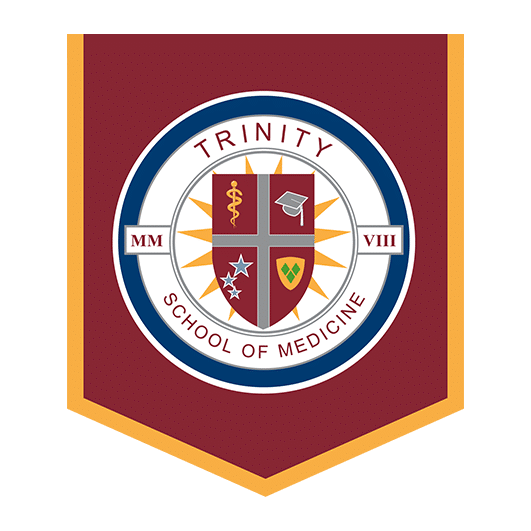Trinity School of Medicine has always prided itself on the strength and ambition of its students. So many future physicians come our way looking for something new; whether that’s a unique learning environment built on support and a strong relationship with the faculty, a curriculum with an emphasis on clinical skills and service to patients, or just a true opportunity to live up to their potential. In this next edition of our alumni spotlight, meet Dr. Katarzyna “Kat” Jurecki, Trinity graduate and attending physician at a private OB/GYN practice in Erie, Pennsylvania.
What made you want to go into medicine?
I always wanted to be a doctor. There was really nothing else for me. I knew that as a Canadian it was going to be very hard to get into medical school, but I had to do it. I’m at my happiest in that “space,” whether now as an attending or back then, volunteering in a hospital. It’s the kind of work that fulfills a very specific need for me.
What brought you to Trinity?
I had a lot of friends who applied here at home [ed. in Canada] and they had a very hard time getting in. Many of them had to try for 4-5 years after undergrad before finally being accepted. I looked into Caribbean schools after trying a few other paths (research) and came across Trinity. Trinity had an information session in Halifax and I got to meet with some of the administrators. Almost right away, it felt like a great option for me.
How fierce is the competition in Canada?
As I’ve touched on, it’s incredibly tough to get admitted at all. You also pretty much have to apply to the province you are from and that’s your only real option. I’m from Ontario, so that’s where I had to apply. Ontario also happens to be one of the more difficult and competitive provinces because of its population density. I thought about trying to apply to another province, (Nova Scotia where I did my undergrad, for example) but when I hit the large, complex collection of road blocks in my way, I realized this was a prohibitively huge undertaking. Canada really doesn’t make it easy for Canadians to go into medical school. I know it’s no picnic in the US, but as a national system, it’s just not like in the States where you can apply anywhere across the country and make it happen.
How was life on St. Vincent?
I loved it. I loved living on the island. I started there in May 2009, and it was a whole new world that my eyes were opened to; even stuff like going to the grocery store was different. Local stores didn’t have what I was used to, it was all so different, but the island is so beautiful. I really do dream about going back on a vacation and relaxing, I had a nice time on my down time. The people are unbelievably nice, it was a really great experience.
Applicants ask about clinical rotations back in the US. How did you feel about them? Were you ready for the transition?
I felt absolutely prepared. We’re in the hospital from day one at Trinity, so first term, we’re going through the hospital at Milton Cato. I heard from other Caribbean students that they didn’t have anything like that; that they’d start in 4th or 5th semester. The idea of waiting felt so strange to me. We’re in medicine to see patients and helping people from the get go was exciting. The faculty at Milton Cato were also fantastic teachers. When we hit clinicals in the US, we’d also seen a lot of different pathology that we wouldn’t have otherwise seen in any other environment, and had a lot of experience with getting information, physicals, etc. I’ve gotten multiple comments from preceptors and attendings that you could really tell the difference in Trinity students.
What made you decide to specialize in OB/GYN?
I love every aspect of medicine, from primary care to surgery; so ultimately, OB/GYN was perfect for me. It encompasses so much of the entire continuum of care. I had considered surgery; I’m very hands on, and I love the operating room, but in the end, I didn’t feel that personal connection to the patients and care in general surgery like I did with OB/GYN.
On top of it all, we have the happiest job in medicine! We get to be with the patient in the most important part of her life, nobody can describe or explain how profound that can be, unless you’re there. It’s incredible.
You decided to stay in the US to practice. Why is that?
I honestly didn’t ever plan on going back to Canada. I maybe thought about it for a brief moment in time, but in all honesty, it came down to my own personal comfort with the US system in which I was educated. I did all my medical school rotations in the United States, my residency was in the States, when I finished, I felt very comfortable practicing here. It had become home.
All that said, I still feel a connection to home. When I graduated, I knew I wanted to stay in the Northeastern United States. That way, I could be very close to family back home, but in my new working comfort zone. That work-stability and proximity to family gave me opportunities to focus more on my work, less on adapting culturally to the work. I admit that sounds strange, I am from Canada, I’m Canadian, but the US practice of medicine is “home” for me.
Do you have any examples of what you mean?
Canada and the US are very similar countries in many ways, very different in others. This difference is really demonstrated in the healthcare system, even as far as just day-to-day operations. Even though I grew up in Canada, the system is just different enough to feel alien to me, now. It’s not just at the national level; specialty by specialty, there’s just a different structure. For example, in Canada, the OB/GYN residency program is five years. It’s four in the US, so for me to go back, I’d actually have to do an extra year of training, and do so in a totally different system that I didn’t feel comfortable with anyway.
Canadian medicine is also, by nature of its government oversight, more about practicing preventative healthcare. Preventative care costs significantly less, and doctors are trying to save more money. In the US, you can practice the way you want without those mandates and restrictions from the government. You can certainly do preventative care, especially with OB/GYN, but it’s less limited. There are other benefits: you can also get people in for tests much faster. I felt more comfortable practicing somewhere that would have that freedom to do what I needed to do and what was right for my patients in that moment.
What was the process like once you finished school? To stay here, work as a physician, etc.?
I don’t know if I’m the most common case, but: I got a J-1 waiver on my H1B visa [ed. read more here]. There’s a lot of work to do, and other Canadians who want to stay should know that it takes a lot of time and preparation to secure the visa you need to work in the US. All in, it took me seven months. It was uncharted territory, a lot of my colleagues were on different visas, so I was figuring out a lot of it by myself. As always though (and this applies to medical school, securing a residency, nearly everything), good preparation is what it comes down to. You have to know in advance what you want to do as far as a specialty, and once you’re there, really tracking down where you want to end up and what you want to do within that specialty. It’s a lot to understand up front, and it’s a complicated path to walk, but it’s worth it.
Where are you now?
I just started my job as an attending in private practice in Erie PA. I graduated from my residency at the end of June, so it’s been a lot of transition very quickly. For now, I’d say I’m getting the lay of the land. Our practice has fourteen providers in total, covering two hospitals, and we do the majority of deliveries for the city of Erie. It’s great work.
Once I’m up to speed, I’ll be split 50/50 between obstetrics and gynecology, with a lot of surgical opportunity, which is very exciting. I’m not doing much research right now, but it’s hard as a new attending to start that from the get go.
Do you have any advice to current students or future applicants?
Yes. The challenge isn’t in getting a residency. A lot of Canadian students are matching from Trinity back in Canada now and are pursuing their career back home, or happily doing so in the US. The trick is training yourself to value preparation. Preparation for everything, residency and beyond, goes the longest way and it’s good to know when you start what your goals are.

